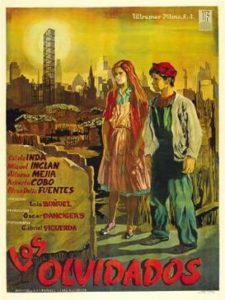Known in the US as The Young and the Damned (1950)
 This is the only Mexican film on my list of 50. The director wasn’t Mexican but Spanish, Luis Buñuel (1900-1983), whom I met in the living room of Arturo Souto Alabarce’s family a few years before he died. Part of Los Olvidados was filmed very close to where I now live, although the area has changed a lot in the last seventy-three years.
This is the only Mexican film on my list of 50. The director wasn’t Mexican but Spanish, Luis Buñuel (1900-1983), whom I met in the living room of Arturo Souto Alabarce’s family a few years before he died. Part of Los Olvidados was filmed very close to where I now live, although the area has changed a lot in the last seventy-three years.
As a young man Buñuel studied in Madrid and emigrated to Paris, where he and Salvador Dalí made two films of the surrealist movement, one of which was banned in Spain. After an unsuccessful stay in the United States, and being unable to return to Franco’s Spain, Buñuel moved to Mexico and became a Mexican citizen. He was even awarded the Palme d’Or at the Cannes Film Festival in 1961 and a Hollywood Oscar for his 1972 film The Discreet Charm of the Bourgeoisie, but he didn’t go to collect it.
If Los Olvidados has any value, it is because, even now, there is not a single degree of how the mistreatment of parents destroys their children’s lives. 1973 and 1980 mark bibliographical milestones with the publication of Lloyd deMause’s History of Childhood and Alice Miller’s Am Anfang war Erziehung. For the first time, the magnitude of the psychological toll of childhood abuse—i.e., mental disorders—was discussed with due solidarity. But their work has become taboo in the so-called mental health professions.
Another facet of the toll of parental abuse is destitution: the number of street children who roam the Third World’s cities. Kids flee the violence at home and society plays dumb. A blocking appears at the beginning of Los Olvidados:
The great modern cities, New York, Paris and London hide behind their magnificent buildings, homes of misery that house abused children, without hygiene, without schooling: breeding grounds for future delinquents. Society is trying to correct this evil, but the success of its efforts is very limited. Only in the near future can the rights of children and adolescents be vindicated so that they can be useful to society. Mexico, the great modern city, is no exception to this universal rule.
Near future, really? In so-called developing countries, never in history have there been so many destitute children as there are today—much more than in the times when Luis Buñuel made his film. And most cases of child destitution are due to physical or emotional violence in the home.
In a personal letter to Buñuel, Benjamin Viel said that he hadn’t seen a clearer indictment of the supposed maternal instinct than in a dialogue of Los Olvidados. In contrast to the stereotype of the good and loving mother, Buñuel showed the detachment of parents from their children: a transgression that caused great fury in Mexico when the film was released in December 1950. Viewers’ discomfort with unmotherly mothers was so evident that even one of the film’s production staff resigned. Not even Gus van Sant’s Elephant, a Cannes award-winning film of the new century about teenagers with family problems, gets to the core of children’s pain as in Los Olvidados:
Pedro: Why do you hit me, because I’m hungry?
Mother: And I’m going to kill you, you scoundrel.
Pedro: You don’t love me.
Mother: Why should I love you?
The plot of the film can be read in the English Wikipedia article, and anyone who wants to watch the movie can do so on YouTube. In a nutshell, Los Olvidados is a fictionalised documentary featuring disparate characters such as El Jaibo and Pedro: a teenager and a smaller kid of different ilk: the former tends to be a troublemaker and the latter to be well-behaved. Both, however, wander hopelessly through the slums of Mexico City. The film ends in tragedy: the body of the boy Pedro, murdered by Jaibo, ends up in a rubbish dump.
One reply on “Los Olvidados”
I have seen several stories like this.
Fathers who were missing and mothers who openly hated their children. Even grand parents can play a role on this. This always leads to a disaster for the children.
If you are interested, you could take a look at the movie “Off the Minnesota strip”. It will show you what happens to many run away Nordic girls, who eventually end up in New York as pimps take them for prostitution.
I had adult friends who have gasped in fear just by looking at one scene where both parents exploded in anger and kicked their daughter out to the streets.
It is truly a sensitive subject for many, and way too common now.